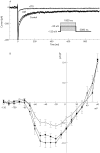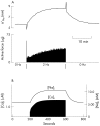Late sodium current in the pathophysiology of cardiovascular disease: consequences of sodium-calcium overload
- PMID: 16775091
- PMCID: PMC1861316
- DOI: 10.1136/hrt.2005.078782
Late sodium current in the pathophysiology of cardiovascular disease: consequences of sodium-calcium overload
Abstract
Late sodium current in cardiac cells is very small compared with the fast component, but as it flows throughout the action potential it may make a substantial contribution to sodium loading during each cardiac cycle. Late sodium current may contribute to triggering arrhythmia in two ways: by causing repolarisation failure (early after depolarisations); and by triggering late after depolarisations attributable to calcium oscillations in sodium-calcium overload conditions. Reduction of late sodium current would therefore be expected to have therapeutic benefits, particularly in disease states such as ischaemia in which sodium-calcium overload is a major feature.
Conflict of interest statement
Competing interests: None declared.
References
-
- Weidmann S.Elektrophysiologie der Herzmuskelfaser. Bern: Huber, 1956
-
- Attwell D, Cohen I, Eisner D.et al The steady state TTX sensitive (“window”) sodium current in cardiac Purkinje fibres. Pflugers Arch 1979379137–142. - PubMed
-
- Sakmann B F A S, Spindler A J, Bryant S M.et al Distribution of a persistent sodium current across the ventricular wall in guinea pigs. Circ Res 200087910–914. - PubMed
Publication types
MeSH terms
Substances
Grants and funding
LinkOut - more resources
Full Text Sources
Other Literature Sources
Medical





